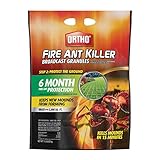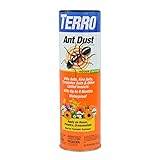Ants may not be considered as dangerous pests, but larger infestations of field ants can cause significant damage to your lawn or garden. Therefore, taking necessary measures beforehand is essential to avoid structural or economic damage.
How to get rid of ants in the lawn? Natural methods such as repellents, diatomaceous earth, and borax are effective for smaller ant infestations, while liquid insecticides or ant baits should be used for larger infestations, as they are strong enough to eradicate entire ant colonies.
To prevent ant colonization in your lawn, maintain the health of your lawn and keep trash away. If you notice any ant mounds or anthills, promptly remove them before they cause a serious problem. It’s important to take strict measures to avoid any expected structural damage to your lawn.
Ants are typically attracted to lawns because of food sources like honeydew, meat, aphids, or bugs or because they are searching for a water source or shelter. It’s crucial to control them at the early stages of infestation, as established colonies have the potential to proliferate at a rapid pace.
In the following sections, we will provide detailed information about ant infestations in lawns, including how they can damage your lawn, prevention and control methods, and some easy home remedies to treat ants in your garden or lawn. Let’s get started!
Ants and Lawn
Ants are social insects living in large colonies, usually found in mounds or ant hills. Each colony comprises one or more queen ants, female workers, soldiers, and reproductive males (drones).
Queen ants are fertile females that lay eggs to establish and grow the ant colony. Female workers are responsible for maintaining and supporting the colony’s growth, while soldiers and drones help to protect the colony and bring food to the nest.
Ants tend to build their nests in well-drained soil, preferably in areas with water-stressed conditions.
Do Ants Kill Lawns?
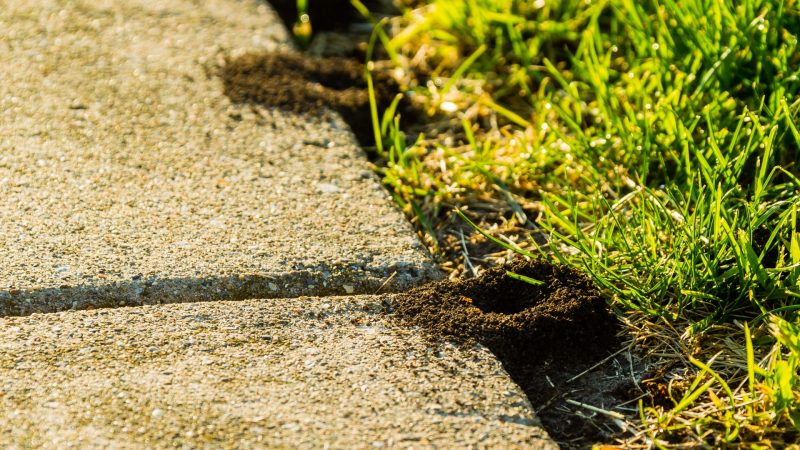
While small ant colonies can be beneficial for soil aeration and plant growth, some ant species have the potential to cause significant damage to your lawn and garden. For example, field ants build underground mounds to establish their colonies, which can damage the root system of nearby plants and grasses.
Similarly, army ants can swarm fields or yards in large groups, numbering in the thousands, and potentially kill vegetation and grass in your lawn. Farming ants secrete hormones to attract aphids to your lawn or garden, which they use as a food source. When aphids are attracted to the ant pheromones and feed on the plants, they can destroy the vegetation. Thus, ants can indirectly cause plant loss in your lawn by attracting other insects.
Are Some Ants Good for Your Lawn and Garden?
While some species of ants can cause significant damage to your lawn and garden, most ants are not a potential threat. Some ants can benefit your lawn and garden as they help in soil aeration, pollination, and seed dispersal and protect your lawn from aphids.
Ants eat up aphids, bugs, and other pests that can harm your lawn or garden. They facilitate the redistribution of nutrients in the soil, act as scavengers, and decompose dead material and insects into fertilizer, which can help in plant growth. They patrol all over your lawn and protect your vegetation from plant-eating insects.
Ants can even help in the flowering process of certain plants, such as peonies, by eating the sticky outer layer around the buds, a great food source for ants. However, keeping an eye on ant colonies in your lawn is still important, as established larger ant colonies can do more harm than good.
Related: Ants in Garden: Are Ants Good for Plants in Your Garden?
Common Types of Ant in the Lawn
Several groups of ant species can be found in lawns, some of which are harmful to your lawn, while others are not. The most common ant species found in lawns include:
- Mound or field ants
- Farming ants
- Army ants (dark brown)
- Carpenter ants (large black ants)
- Funnel ants
- Fire ants
- Ghost ants
- Pavement ants
- Pharaoh ants
- Cornfield ants (brown ants)
It is important to note that while some ants can benefit your lawn, others can cause significant damage. It is essential to take necessary measures to control or eliminate them, depending on the level of infestation.
Will Insecticides That Kill Ants Damage Lawn
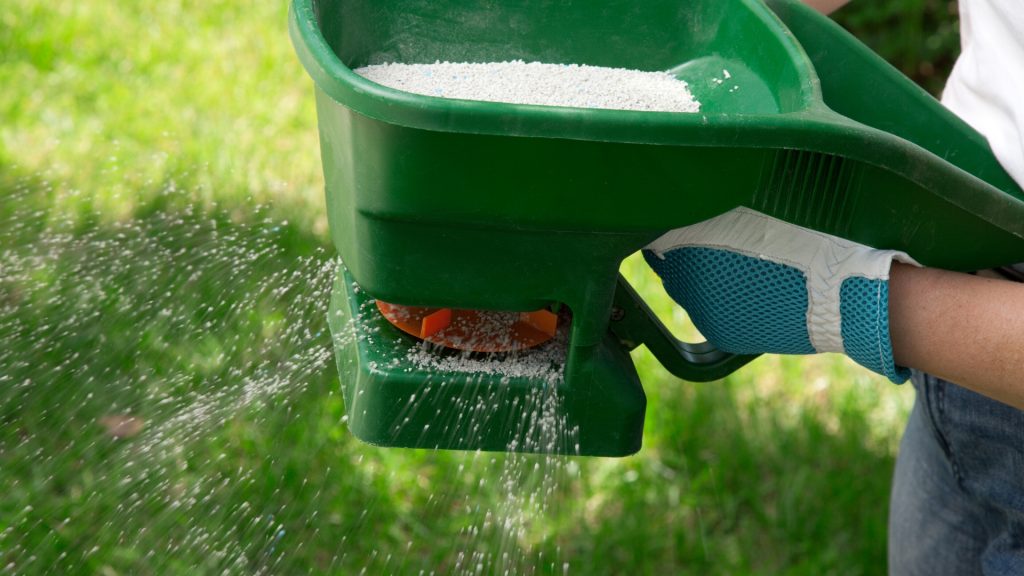

Whether or not insecticide treatment will damage your lawn depends on the type of insecticide used. Some control solutions can harm your grass if not applied according to the instructions.
To avoid potential lawn destruction, seeking professional help from an ant exterminator or reading the complete instructions before applying insecticide is important. Prepare the insecticide solution according to the guidelines and treat the infested area to control ant colonies. Some insecticides come with ready-to-use spray bottles.
Insecticide treatment is an effective method for highly infested areas, as they can kill the ants right after treatment and are typically cheaper than other ant killers. However, improper handling of insecticides can lead to unintended consequences, including damage to your lawn, which is why it is essential to follow the instructions and seek professional help if necessary.
Ant Treatment for Lawns – Instructions
Small ant colonies may not immediately harm the health of your lawn or garden’s health, but they indicate a potential threat due to their rapid growth and mound-building capabilities. While most ant species do not use grass or other plants as a food source, established colonies can cause significant damage to the root system of plants in your lawn and can lead to serious issues if not controlled early on.
Each ant colony may contain one or more queens, and a queen’s survival determines the entire colony’s survival. Therefore, multiple well-managed insecticide treatments may be required to eradicate ant infestations from your lawn completely.
In the following sections, we will discuss ways to save your lawn from ant infestations and how to control them effectively.
Chemicals | Liquid Insecticides

Liquid insecticides, sprays, or solutions can effectively eliminate ant infestations, and several commercial options are available. Each insecticide solution comes with specific instructions or guidelines and is a relatively cheaper solution showing instant results after treatment.
To use liquid insecticides to deal with a larger infested area of your lawn, you should follow these steps:
- Use personal protective equipment, such as long sleeve rubber gloves, long shoes, masks, and protective eyewear, to avoid mishaps.
- Prepare the liquid solution by following the instructions given on the insecticide bottle. You can find lawn grass-compatible sprays commercially to avoid any damage due to the insecticide.
- Locate the ant mounds or hills in your lawn and drench them with enough liquid ant killer solution. You may require 1 to 2 gallons of insecticide solution for each mound to completely drench it.
- The method shows effective control in a few hours, but to completely control ant infestation, you may need to repeat the process after 10 days.
By following these steps, you can effectively use liquid insecticides to control ant infestations in your lawn.
Related: What Chemicals do Exterminators Use for Ants?
Ant Baits
Ant baits are another method to get rid of ant colonies in your lawn, which works differently than liquid insecticides. It is a relatively slow process, and the selection of the proper ant bait is necessary to control the specific species of ants in your lawn, as baits can work for one ant species and not work for another.
Several ant baits are available commercially, including sugar-based ant baits, fat-based or greasy ant baits, and protein-based ant baits. With the ant bait method, worker ants take the poisonous ant baits to their nests and ingest them, including the queen, which ultimately causes the colony’s death. This slow-acting process can take 2 weeks to 3 months, depending on the size of the ant colonies.
To effectively use ant baits, apply them on the ant trails, at entry points, and near mounds to lure ants out of their nest. Evenly sprinkle the baits 1 to 3 ft. around the nest in the dry area without disturbing the ant mound. You will see results within two weeks, as ants are most active in the late afternoon or evening during summer. This process is safe and does not damage lawn grass or other vegetation.
For an effective pest control strategy, use an integrated pest management technique by applying liquid insecticide after the ant bait has killed the queen. This will help to control any remaining ants and prevent future infestations.
- Attracts & Kills – Kills common household ants including...
- Kills the Ants You See & the Ones You Don't – As worker ants...
- Works Fast – You should see a significant decrease in the...
- Ready to Use – Place the bait stations, watch it attract ants,...
- Use Throughout Your Home – Place stations near areas where...
- Attracts & Kills – Kills common household ants including...
- Kills the Ants You See & the Ones You Don't – As worker ants...
- Works Fast – You should see a significant decrease in the...
- Ready to Use – Place the bait stations, watch it attract ants,...
- Multi-Surface Application – Adhesive strips allow you place the...
- STARTS KILLING ANTS IN HOURS: Hot Shot MaxAttrax Ant Bait...
- KILLS THE QUEEN COLONY: Works up to 6 months indoors
- INDOOR AND OUTDOOR USE: Use near walls, in closets and cabinets,...
- CHILD RESISTANT: Contains 8 child-resistant bait stations
• Ant Killer Granules
Ant killer granules are another method to eliminate ant infestations in lawns and gardens. They are a type of ant bait, and several ant killer granules are available commercially. To treat your lawn, apply insecticide granules around ant mounds evenly without disturbing them. In some cases, you may need to activate the granules with water, but this depends on the type of granules being used.
Always follow the instruction manual provided with the ant killer granules to ensure the most effective results. This method is safe and non-destructive, making it an effective option for controlling ant infestations in your lawn.
- Yard protection granules: kills the mound and prevents new mound...
- Kills the queen and colony: kills the fire ant queen and colony...
- Season-long control: up to 3 months control against red imported...
- Also kills: crickets, chinch bugs, armyworms, bill bugs,...
- Money-back guarantee: guaranteed results or your money back –...
- Ortho Fire Ant Killer Broadcast Granules target and kill fly-in...
- FAST ACTING: This outdoor fire ant killer will kill fire ant...
- PROTECT THE GROUND: Treat the entire lawn area to protect your...
- EASY TO APPLY: Use a drop or broadcast spreader to apply, and...
- USE AS PART OF ORTHO 2-STEP SYSTEM: First, destroy existing...
- 2 shaker bags included
- Kills ants, fire ants, cockroaches, fleas and other insects
- Fast-acting granules kill insects in 24 hours
- Keep insects out – use as band treatment around house...
- Convenient, resealable shaker bag – no spreader required
• Ant Killer Gel
Ant killer gel is another method used to eliminate ant infestations, and it works similarly to other ant baits. You can place sugar-based gel droplets near ant trails and mounds to lure the ants and eliminate the colonies. This method is also harmless and does not threaten your lawn or other plants.
- Targets most pest species of ants, including all key sweet...
- Features a highly attractive, homogenous formulation
- Indoxacarb, the active ingredient, is the only member of its...
- Ants consume more Advion Ant gel bait over an extended period,...
- By combining a proprietary active ingredient with a highly...
- Helps get rid of ants in just 3 to 5 days
- Best used in cracks and crevices where ants enter the home
- Eliminates the entire ant colony
- Fipronil, one of the most powerful ant killers, starts to...
- This package contains one 0.95 ounce syringe of Combat Max Ant...
- For use in residential, institutional, commercial, and industrial...
- Targets most pest species of ants, including all key sweet...
- Indoxacarb, the active ingredient, is the only member of its...
Ant Killer Dust
Ant killer dust is another method that can be used to eliminate ants from your lawn or garden. Using the recommended quantity, you can apply insecticide powder or dust around the ant mounds. The dust is detrimental to ants when they move in or out of the mound, eventually killing the whole colony within a few days.
- Effectively Kills Insects - Kills ants (including fire &...
- Waterproof Formula - The waterproof dust won't wash in the rain
- Fast Acting & Long Lasting - This dust kills insects on contact...
- Easy to Apply - The convenient shaker canister allows for both...
- Use Indoors & Outdoors - Apply in cracks and crevices, around...
- Got Pests? Get Revenge! REVENGE Ant Killer Dust kills insects...
- This product works against ants, fire ants, fleas, ticks,...
- 1lb of Ant Killer Dust covers up to 2,000 sq ft and can be used...
- The special Deltamethrin formula kills listed insects on contact....
- Ant Killer Dust arrives conveniently ready to use! This product...
- Kills ants on contact
- Provides long-lasting residual control up to eight months
- Waterproof, will not wash away in rain
- Ideal for crack and crevice treatments; Easy to use shaker can
- Can be used indoors or outdoors
Biological Control
The biological control method is a safe and effective option for eliminating ant infestations in your lawn. Professionals can water parasitic nematodes near ant mounds (Steinernema spp.) to control the ant colonies in lawns or gardens.
These microscopic nematodes can enter the insect bodies and paralyze them, helping to control the ant population. Additionally, parasitic fungi such as Beauveria bassiana can control ant infestation to a limited extent. Although professionals usually do this method, it is an interesting and effective option for controlling ant infestations in your lawn.
Best Ant Killer for Lawns | Lawn Ant Control
- INSECT KILLER: Kills all types of listed lawn invading pests
- KILLS FIRE ANTS: Kills fire ants and prevents new mound formation...
- TREATS 25,000 SQUARE FEET: See results in minutes
- SEASON LONG CONTROL: Starts to work immediately and keeps working...
- Ortho Fire Ant Killer Broadcast Granules target and kill fly-in...
- FAST ACTING: This outdoor fire ant killer will kill fire ant...
- PROTECT THE GROUND: Treat the entire lawn area to protect your...
- EASY TO APPLY: Use a drop or broadcast spreader to apply, and...
- USE AS PART OF ORTHO 2-STEP SYSTEM: First, destroy existing...
- Kill 235 bugs, including ants, ticks, armyworms, mosquitoes,...
- Starts killing within minutes and provides long-lasting control
- Use on lawns, around a home's perimeter, and on ornamentals,...
- Easily apply insect spray by connecting a garden hose to the...
- Provides treatment for a 5,300 sq. ft. lawn, 1,400 sq. ft. of...
- OUTDOOR USE: Insect killer for lawns
- KILLS ALL LISTED LAWN-DAMAGING INSECTS: Ants*, crickets,...
- SEASON-LONG CONTROL: Season-long control of ants* at a rate of 2...
- COVERAGE: 10-lb bag covers up to 12,500 sq ft of lawn; 20-lb bag...
- DISTRIBUTE GRANULES EVENLY AROUND TREATMENT AREA: Water in...
- Protect your lawn and garden against over 100 listed insects with...
- OUTDOOR BUG KILLER: Kills above and below the ground; use as an...
- SEASON-LONG CONTROL: Provides 3-month residual control of listed...
- BUG BARRIER: The granules protect your lawn, flower and vegetable...
- EASY TO USE: Apply using a Scotts spreader, water the granules...
How to Get Rid of Ant Hills in the Lawn?
If you want to get rid of ant hills in your lawn, it’s important to remember that they are indications of an established ant colony. Ant hills comprise decomposed material, clay, sand, and tiny rock particles and can go several feet deeper and wider under the soil surface. They provide a safe shelter to ants and can grow to thousands and millions if not disturbed. Simply leveling the anthill will not solve the problem.
The first step to getting rid of ant hills is to locate them. You can place ant baits to track the ants back to the anthills. Once you’ve located the ant hills, the easiest way to get rid of them is to apply boiling water directly over the mounds at the ants’ entry points. Pour hot water to drench the ant mound completely, and you can add liquid soap to the steaming hot water to increase its effectiveness. This simple method can kill most of the ants inside the ant hill.
If you want to know more about ant hills and how to get rid of them, read our article: How to Get Rid of Ant Hills | Safe and Effective Methods
Tiny Ant Hills All Over Lawn: What Can You Do to Prevent This?
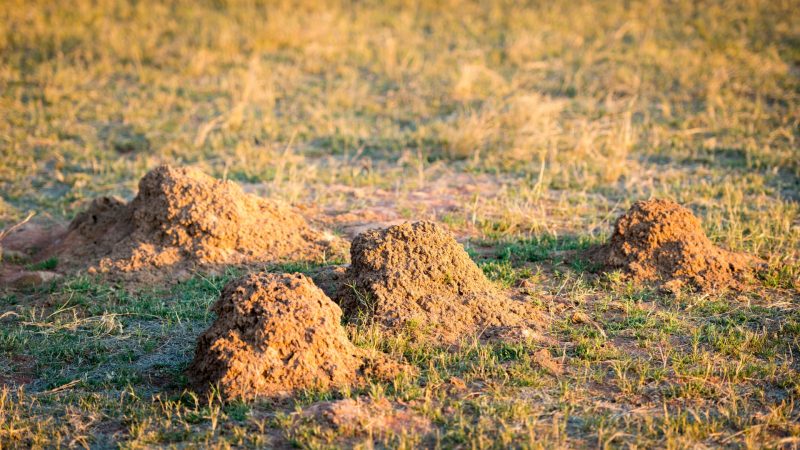
Ants are attracted to your lawn or garden, searching for food sources, water, or shelter. Suppose your lawn is well-drained or has good food sources (such as aphids, honeydew supply, bugs, or other dead material). In that case, there is a great possibility of getting ant infestations or re-establishing previous colonies.
Some ant species are attracted to organic mulches (used for shelters) or organic fertilizers that can be a potential food source for ants. Ants are also drawn to specific plants, and they help in their flowering and seed dispersal. Small colonies of ants are not a threat to your lawn, and their tiny ant hills are somewhat easy to remove and prevent from appearing.
- You can plant ant-repellent plants or treat your lawn with insecticides around the borders to eliminate the chances of larger ant infestations.
- To avoid re-establishing ant colonies in your lawn, displace the compost piles and trash bins far from your lawn and monitor if there are ant hills. Rake the tiny anthills to disrupt the re-colonization of ants and treat them with insecticide spray or hot water.
How to Kill Ants in the Lawn Without Killing Grass?
You can use natural methods or home remedies to eliminate ants from your lawn or garden for a safer and cheaper solution. The DIY home remedies can help to eradicate the ant colonies without damaging your lawn. In the following section, we have given some effective and easy-to-do home remedies for removing the ants in your lawn.
• Soapy Water
Soapy water is one of the best home remedies to remove the ant infestation from your lawn. To prepare a soapy water spray, mix 1.5 tablespoons of oil, and half a teaspoon of liquid soap in one quart of water.
Pour the solution into a bottle and spray the solution at the entry points of the mounds. Do not spray directly on the grass to avoid plant loss. The soap water enters the exoskeleton of the ants and suffocates them to death.
• Vinegar Solution
Mix equal parts of white vinegar and water to prepare the vinegar solution. Directly pouring the white vinegar over the mound can help eliminate the ant colony. It does not damage the plants in your lawn and instantly kills the ants due to its acidic nature.
• DIY Ant Baits
You can prepare honey, sugar, or peanut butter baits by mixing boric acid until it becomes a paste. Change the bait according to the infested ant species. It may be a slow-acting process, but it won’t cause any harm to your grass or other plants.
• Chilli Powder
Chilli or cayenne pepper is an insect repellent to keep the ants out of your lawn. You can also prepare the cayenne pepper spray to eliminate ant colonies. To prepare an ant killer spray, mix 3 tablespoons of cayenne pepper sauce with half a teaspoon of liquid soap and 1 quart of water. Pour the solution on the entry points of anthills, and you will destroy the colonies.
• Insect Repellent Plants
Several plant species are used as an insect repellents and are vital in keeping the ants away from your lawn. Some of them are sage, catnip, lavender, peppermint, tansy, rosemary, thyme, marigold, garlic, cinnamon, chili, cloves, and other aromatic herbs.
• Diatomaceous Earth
Applying diatomaceous earth is a non-toxic, eco-friendly, and harmless way to eliminate ant colonies in your lawn. You can apply the diatomaceous earth around the mounds and on the ant trails. This will suffocate the ants and eventually cause their death.
Related: How to Get Rid of Ants Naturally: A Complete Guide
Takeaway: Ants can cause significant damage to lawns and gardens when they establish large colonies. Anthills or mounds can be misleading as they contain extensive underground tunnels up to 3 feet deep and 4 feet wide. The queen ant lays eggs and is responsible for the survival of the entire colony. To get rid of the colony, the queen must be eliminated.
Several methods are available, including liquid insecticides, ant-killer granules, ant-killer gel, ant-killer dust, and biological methods. Natural methods or home remedies can eradicate ants from your lawn or garden. It is important to maintain the health of your lawn and monitor it regularly to prevent the re-establishment of ant colonies.
Related: How to Get Rid of Ants | Safe and Effective Methods
List of Sources
Vittum P., Ants in Lawns, University of Massachusetts Amherst
Lewis D., Ants in Lawns, Iowa State University
Ants in Home Lawns, The Pennsylvania State University
Hahn J., Ants in Turf, University of Nebraska – Lincoln
Product Toxicity Ratings, AustinTexas.gov
- How to Get Rid of Copperheads | Practical Guide - August 27, 2023
- How to Get Rid of Corn Snakes | What Makes Them Aggressive? - August 27, 2023
- How to Get Rid of Alligators | Safety Measures and Removal Methods - July 16, 2023





